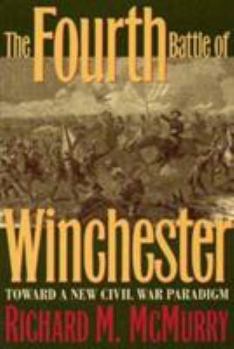The Fourth Battle of Winchester: Toward a New Civil War Paradigm
Select Format
Select Condition 
Book Overview
This text, using a counter-factual account of the 1864 campaigns in Virginia, presents a view of the American Civil War from the West - moving the narrow confines of the Old Dominion to the vast... This description may be from another edition of this product.
Format:Paperback
Language:English
ISBN:087338721X
ISBN13:9780873387217
Release Date:March 1998
Publisher:Kent State University Press
Length:150 Pages
Weight:0.68 lbs.
Dimensions:0.5" x 8.7" x 6.6"
Customer Reviews
4 ratings
Quirky, clever discussion of grand strategy in the civil war
Published by Thriftbooks.com User , 17 years ago
McMurry's title is ironic -- there was no Fourth Battle of Winchester. He begins the book with a "what-if" counterfactual story of the Confederates decisively winning the 1864 battle of Cedar Creek, which would therefore have been known as the Fourth Battle of Winchester for the town through which the retreating Yankees would have fled. McMurry goes on to describe a series of plausible Confederate victories in the Virginia theater following this one, resulting in more glory for Robert E Lee, more defeats for the Army of the Potomac, yet... despite all of this: the inevitable defeat of the Confederacy. This is all a clever way of arguing that the Western (Trans-Appalachian) theater of the Civil War was the decisive Union victory, and that defeat here inevitably sealed the Confederate's fate. Regardless of the Virginia theater. McMurry is extreme about this argument, to the occassional point of ridiculous claims: "Gettysburg has had far greater impact on the tourist business of Adams County Pennsylvania than it ever had on the military outcome of the Civil War." But no matter -- these are somewhat tongue and cheek statements made for effect. In fact McMurry's chatty, quirky tone and sense of humor aid considerably in making his argument sympathetic. The book is a short essay, and the author jumps nimbly from topic to topic on why the Confederacy really lost the war through battles like Fort Donelson, Shiloh, and Vicksburg. The book is a unique and thought-provoking addition to the literature on Civil War grand strategy
Quick read
Published by Thriftbooks.com User , 18 years ago
Perhaps nothing more to add to the first two reviewers (with whom I agree with) other than to state that this book allows one to consider the importance of the West to the Confederates' cause. While I believe the first three chapters are nothing more than entertaining, at best, the last chapters are more worthwhile to a student of the Civil War. I found myself agreeing with some of McMurry's thesis while arguing with others. But as the author states, what better way to stir the discussion about how and why the Confederacy lost the war. If you are considering buying this book I would encourage it, for it caused me to delve in further into the subject, yes, by buying other books referenced.
Convincingly Argued
Published by Thriftbooks.com User , 19 years ago
In this relatively short book, beginning with a counter-factual, the author argues that it is impossible to understand the Civil War without studying the western campaigns. Kentucky's neutrality gave the Confederacy time to prepare its defenses in the west, and hopefully to woo the vital state with its easily defensible northern border to its side. Instead, the bishop General Polk violated its neutrality, forcing it to the Union side. The Mississippi, Cumberland and Tennessee Rivers gave the Union navy and army clear paths deep into the Confederacy, making most of the important state of Tennessee untenable. Although Robert E. Lee is frequently criticized for lacking a good overall vision of the war, McMurry argues that his actions were best for the Confederacy, that only by great success in Virginia could the losses in the west be negated and Southern independence won.
Fun to read
Published by Thriftbooks.com User , 22 years ago
This is a book on Civil War grand strategy during the last year of the war. It assumes the reader is familiar with the campaigns and battles mentioned, and so is not for a Civil War novice. The book begins with a counterfactual depiction of Early's raid, and the resulting consequences. It then segues to the author's previously published arguments that the West was the decisive theatre, and that Grant should have stayed there or at least put Thomas in command. ... The book then concludes with a short defense of Lee's grand strategic thinking. I found the book so interesting, readable, and short, that I finished it in one four hour sitting. At times the arguments seemed a little overwrought, and I'm sure those who feel the East was the decisive theatre will have their counter arguments, but none of this prevented my enjoying the book.






